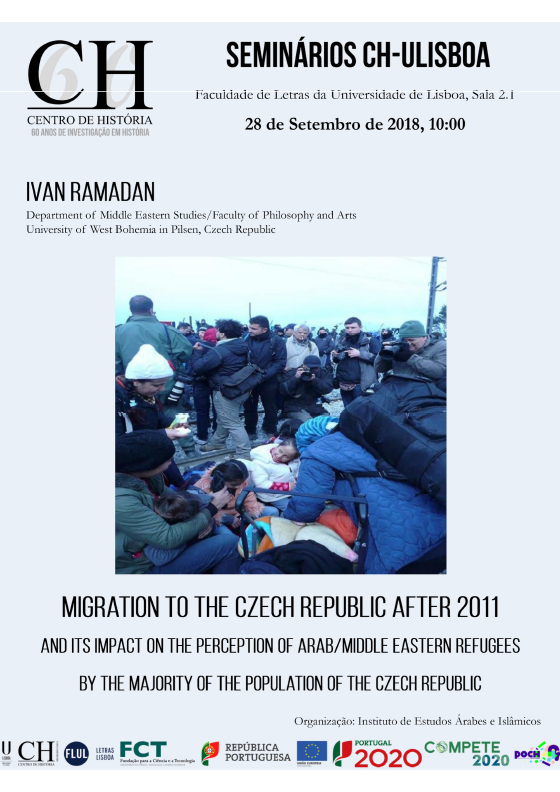Migration to the Czech Republic after 2011 and its impact on the perception of Arab/Middle Eastern refugees by the majority of the population of the Czech Republic | Seminários CH-ULisboa
Faculdade de Letras da Universidade de Lisboa, 28 de Setembro de 2018, Sala 2.1, às 10:00
Organização | Centro de História da Universidade de Lisboa - Instituto de Estudos Árabes e Islâmicos
Descarregar cartaz

Ivan Ramadan
Department of Middle Eastern Studies
(Faculty of Philosophy and Arts, University of West Bohemia in Pilsen, Czech Republic)
After the Velvet Revolution in 1990 there was only around 35 thousand foreigners living in the Czech republic who had a permanent residence or long-term residence in the country. The rise of the number of foreigners between 2011 until 2015, when they were around 465 thousand, could not be however linked to the stormy events which waged in the Middle East and are still lasting until nowadays. 5 years after the so called Arab Spring started, there were only 148 receivers of the international protection, of whom 101 were Iraqis and only 5 Syrians and no other Middle Eastern refugees. This Lecture aims to present the preception of Arab, Kurdish and other Middle-eastern refugees by the majority of the Czech society and popular models of thinking related to the Migration from the Middle East after 2011. It tries to show, that the intensity of the public debate on refugees and migration crisis in the Czech republic (in case of some, a panic), doesn´t correspond to the real number of refugees, who arrived to the Czech Republic since 2011, when the so called Arab spring in the Arab countries started.
Mgr. Ivan Ramadan, Ph.D.
Mgr. Ivan Ramadan, Ph.D., born in Prague, is an Arabic language Specialist and a Modern Middle East historian at the Department of the Middle Eastern Studies at the University of West Bohemia as well as at Fachakademie für Übersetzen und Dolmetschen in Weiden, Germany. As a Social and Cultural Anthropologist he was focused on multicultural policies towards the Roma community of the Czech Republic. As a Linguist and an Anthropologist of the Middle East he concentrates on the arabic grammar and proverbs as well as on the modern history of Syria and Egypt from the political, economical and social viewpoint.
In his recent articles he aims for describing the latest development tendencies and processes accompanying the so called Arab Spring, which has started in the Middle Eastern Area since 2010. In his dissertation thesis he also dealt with the Medieval Arabic/Islamic Science, particulary with the Interpretation of the Arabic/Islamic Medieval Medicine in the western and arabic/islamic historiography of science. He has published several articles and monographs such as Multicultural Policies of the Czech Republic towards the Roma Community (2005), Arabic Popular Proverbs Nowadays and in the Past (2011). In the secrets of Arabic Grammar (2014), Syria within the book Arab spring II. part – Syria and the Arab Peninsula (Křížek; Tarant 2014), or Medieval Arabic/Islamic Medicine: History of Interpretation (2015). He had also lectures at foreign universities, for instance at the Al-Mustafa International University in Qom, Iran, or at the Universität Bayreuth, Germany. He is also active as a Court Interpretor (Arabic/Czech language), especially in connection with the Middle Eastern refugees, as his latest participation on the Czech/Bavarian Migration Project (MINT) relates to the Migration and Social Integration issues.

